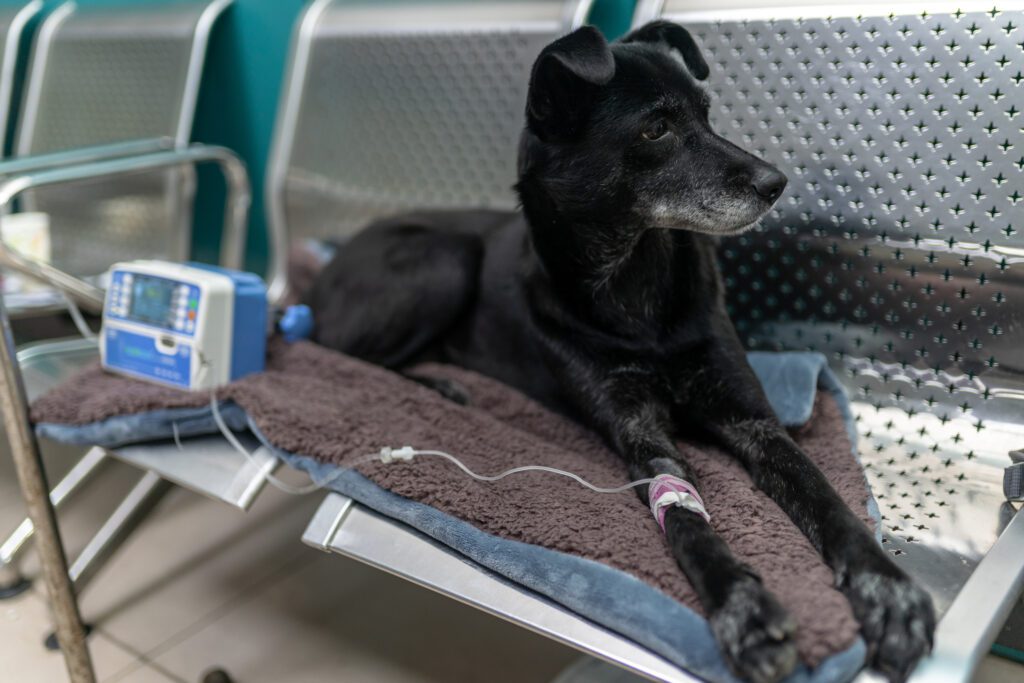Recognizing Pet Emergencies
Our pets are cherished members of our families, and their health and well-being are paramount. While routine check-ups and preventive care are essential, there are situations when our furry friends may require immediate attention.
As pet parents, it’s crucial to recognize common pet emergencies that warrant a visit to our trusted veterinary team. In this article, we’ll highlight some of these critical situations to ensure your beloved pets receive timely care.

1. Difficulty Breathing
If your pet is struggling to breathe, it’s a clear sign of a severe problem. Respiratory distress can be caused by various factors, including allergic reactions, heart conditions, or obstructions in the airway. Labored breathing, persistent coughing, blue/purple gums, open-mouthed panting at rest, or wheezing all demand immediate veterinary attention.
2. Severe Injury or Trauma
Accidents happen, and pets can sustain injuries from falls, collisions, or fights with other animals. Any visible wounds, broken bones, or injuries to the head, chest, or abdomen should be treated as emergencies. Even if there are no apparent injuries, if your pet has been involved in a traumatic incident, it’s best to have them checked by our experienced team.
3. Uncontrolled Bleeding
Bleeding that doesn’t stop or is profuse can quickly lead to life-threatening situations. Apply pressure to the wound with a clean cloth or bandage, and get your pet to St. Paul Pet Hospital immediately.
4. Ingestion of Toxic Substances
Pets are naturally curious, and they may ingest harmful substances like chemicals, certain plants, or human medications. If you suspect your pet has consumed something toxic, don’t wait for symptoms to appear. Contact us immediately, or if you know what your pet ingested, call the ASPCA Poison Control Center (888-426-4435) for guidance.
5. Seizures
Seizures can be caused by various underlying conditions, including epilepsy, brain tumors, or toxins. If your pet experiences a seizure, it’s essential to seek veterinary care promptly to determine the cause and provide appropriate treatment.
6. Difficulty Urinating or Defecating
Straining to urinate or defecate can be indicative of serious issues such as urinary tract blockages or gastrointestinal obstructions. These conditions can be excruciating and require immediate veterinary intervention.
7. Sudden Paralysis or Inability to Move
Sudden loss of mobility or paralysis in your pet could result from spinal injuries, neurological problems, or tick paralysis. These cases require immediate attention to determine the cause and provide appropriate care.
8. Severe Vomiting or Diarrhea
While occasional vomiting or diarrhea can be common, persistent or severe episodes can lead to dehydration and other complications. If your pet is vomiting or having diarrhea continuously, it’s time to visit St. Paul Pet Hospital.
9. Unconsciousness or Collapse
If your pet suddenly loses consciousness or collapses, it’s an obvious emergency. This could result from various causes, including heart conditions, low blood sugar, or trauma.
10. Difficulty Giving Birth
If your pregnant pet experiences prolonged labor, visible distress, or difficulty delivering a puppy or kitten, it’s crucial to seek veterinary assistance immediately. Complications during birth can endanger both the mother and her offspring.
Reach Out to Our St. Paul, MN, Vet Team Immediately If Your Pet Is Having an Emergency
As pet owners, it’s our responsibility to be vigilant and proactive when it comes to our pets’ health. Recognizing the signs of a pet emergency and seeking prompt veterinary care can make a significant difference in your pet’s prognosis and well-being.
If you encounter any of these critical situations or have concerns about your pet’s health, don’t hesitate to reach out to our dedicated veterinary team in St. Paul, MN. Your pet’s health and happiness are our top priorities, and we’re here to provide the best care in times of need.

